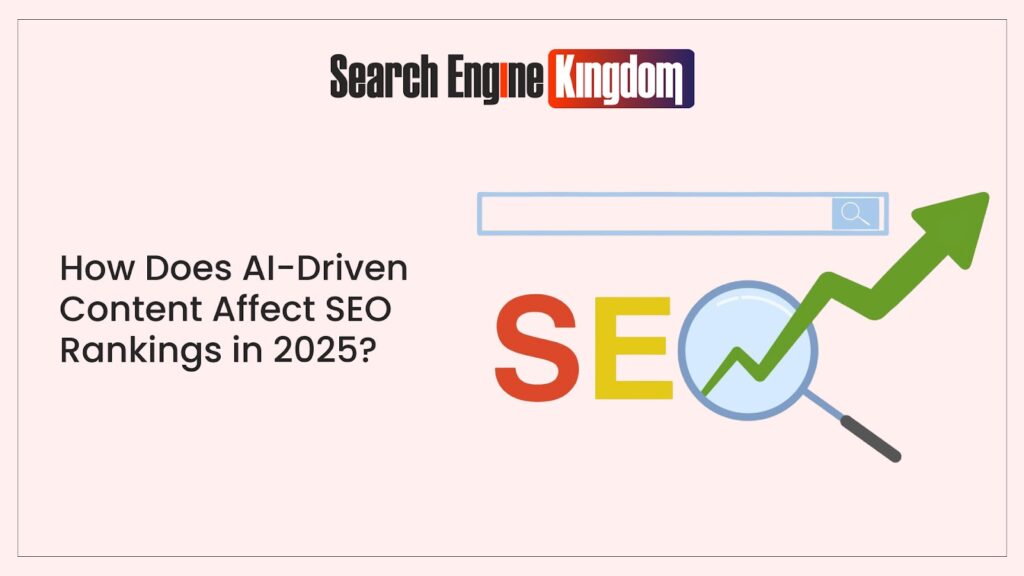
The landscape of SEO is evolving rapidly, and in 2025, AI-driven content will play a significant role in how websites rank. With Google’s advanced AI algorithms like BERT, RankBrain, and MUM becoming more sophisticated, the way we approach content creation and optimization needs to change. But how exactly does AI content affect SEO rankings? Let’s explore.
Understanding AI-Driven Content
AI-driven content refers to content created or optimized using AI tools that assist with writing, keyword analysis, and readability. Examples include AI-generated articles and optimization platforms. Google’s AI algorithms, such as BERT, RankBrain, and MUM, are designed to understand search intent and context. As these algorithms improve, they reward content that aligns with AI-driven criteria, such as natural language, in-depth coverage of topics, and content that delivers value to users.
How AI-Driven Content Impacts SEO Rankings
Here are the primary ways AI-driven content will affect SEO rankings in 2025:
1. Focus on User Intent Over Keywords
AI algorithms like BERT are designed to understand not just keywords, but the context and meaning behind them. In 2025, the focus will shift from keyword-heavy content to content that fully addresses the user’s intent. AI-driven content tools can help create content that naturally aligns with what users are searching for, ensuring it matches their needs.
Impact on Rankings:
Content that directly answers users’ questions and meets their intent will be rewarded by search engines. If your content answers the query comprehensively, you’re more likely to rank higher.
2. Natural Language Processing (NLP) and Readability
With AI technologies, Google now understands how words and phrases interact in a more human-like way. This means that content which sounds natural, is easy to read, and flows smoothly will rank higher. AI content tools can assist in making sure your content aligns with how people actually speak and search.
Impact on Rankings:
If your content is written in a conversational tone, easy to understand, and uses natural language that resonates with users, it’s more likely to rank higher. Google values content that feels “human.”
3. Content Depth and Relevance
AI tools, such as those used in Google’s MUM algorithm, are designed to analyze large amounts of data and provide more comprehensive, relevant answers to complex queries. In 2025, content that covers a topic in-depth, answers multiple facets of a question, and provides valuable, insightful information will be favored.
Impact on Rankings:
Shallow, low-quality content won’t perform as well. Comprehensive, long-form content that covers topics from all angles and provides real value will rank higher.
4. Personalized User Experience
AI is also enabling more personalized search results, taking into account the user’s history, preferences, and behavior. With this shift, AI-driven content that is more tailored to individual users’ needs—whether through targeted content creation or SEO—will have a better chance of ranking.
Impact on Rankings:
Content that resonates with your audience’s unique preferences and needs will be more likely to rank well. Leveraging AI tools to create personalized content can give you an edge.
5. Improved Content Optimization with AI Tools
AI-driven tools are becoming more adept at helping optimize content for SEO. These tools analyze search trends, competition, and user engagement to recommend adjustments that improve content relevance, keyword targeting, and overall quality.
Impact on Rankings:
By using AI-driven optimization tools, your content is more likely to stay in line with current trends and ranking factors, boosting your chances of ranking higher.
6. Multimedia Integration
With Google’s AI advancements, including MUM, search engines are getting better at processing various content forms, such as videos, images, and podcasts. AI content can optimize multimedia elements by automatically adding appropriate tags, descriptions, and keywords, enhancing their search visibility.
Impact on Rankings:
Rich media that is optimized correctly for SEO can improve your rankings. AI can help ensure that your multimedia content is search engine-friendly, making it easier for Google to index and display in search results.
How to Leverage AI-Driven Content for SEO in 2025
To make the most of AI-driven content for SEO, consider the following strategies:
- Focus on Content Quality:
Use AI to enhance your content’s depth and relevance, ensuring it answers the most important questions your audience has.
- Optimize for Natural Language:
Create content that’s easy to read, sounds natural, and matches conversational search queries.
- Utilize AI Tools for Content Optimization:
Use AI-driven SEO tools to analyze and optimize your content for better keyword targeting, topic relevance, and readability.
- Integrate Multimedia:
Use AI to enhance your use of images, video, and audio by making sure it’s all optimized for search engines.
- Prioritize User Intent:
Align your content with what users are looking for, rather than simply focusing on keyword rankings. Understand the intent behind searches and create content that answers those needs directly.
Conclusion
In 2025, AI-driven content will play a crucial role in SEO rankings. As Google continues to enhance its algorithms with machine learning and natural language processing, it’s essential to adapt your content strategy accordingly. Focus on quality, natural language, user intent, and multimedia optimization, and use AI tools to stay ahead of the competition.
By embracing AI-driven content and using it effectively, you can create content that not only ranks higher but also delivers real value to users—keeping Search Engine Kingdom at the top of search results for years to come.
